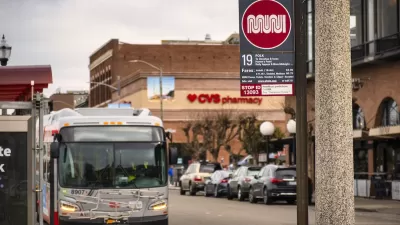Despite a grassroots campaign to retain Sunday parking meter charges it only approved two years ago, the San Francisco MTA agreed with Mayor Ed Lee to drop the charges, hoping that voters would approve two transit funding measures in November.
"The San Francisco Municipal Transportation Agency Board of Directors today [Tuesday, April 15] caved to pressure from Mayor Ed Lee by removing Sunday parking meters, a move folded into its approval of the agency’s two-year budget," writes Aaron Bialick of Streetsblog SF. The lifting of Sunday parking charges pased on a 7-1 vote and the SFMTA budget was unanimously adopted by the board, "setting up another showdown at the Board of Supervisors when it considers the MTA budget," writes Jaxon Van Derbeken of the San Francisco Chronicle.
Bialick has been chronicling the Sunday parking charge issue since the board approved it two years ago.
Jessica Kwong of The Examiner suggested that board members hoped that by dropping the Sunday parking charges, voters would be more willing to approve two critical ballot measures to fund SFMTA: "a $500 million general obligation transportation bond and a vehicle license fee (VLF) that would generate $1 billion over 15 years. The approximately $11 million parking meters and citations generate per year pales in comparison, they note."
That is a gamble, though. Last December, "(a) privately funded poll commissioned by the mayor's office found a majority of San Franciscans surveyed opposed Lee's idea of more than tripling the vehicle license fee for city residents - to 2 percent- to help pay for more than $10 billion in Muni and other transportation upgrades," wrote Phillip Matier and Andrew Ross in The Chronicle. The measure needs to pass by two-thirds to win.
"Despite requests from the San Francisco Transit Riders Union, Livable City, bicycle and pedestrian advocates and other groups for Sunday meters to continue, SFMTA board members sided with the mayor and populations like elderly churchgoers," wrote Kwong.
Tom Radulovich, executive director of Livable City, "said the parking meter money could be used to bolster bicycle and pedestrian safety programs and expand free Muni for seniors and young people," wrote Van Derbeken. The churchgoers had better luck.
"Churchgoers were being targeted as a group," said Rev. Keva McNeill of El Bethel Baptist Church, and "were impacted more than anybody, having to leave the service to put money in the meter."
[Churchgoers also flexed their political muscle in their hopes to lift parking restrictions on a bike lane in Maryland as we noted here recently.]
In passing the SFMTA budget, the board approved "a Muni single-trip fare increase of a quarter to $2.25, a 10 percent boost in service systemwide and expanding the free Muni for low- and moderate-income youth into a permanent program that includes 18-year-olds," wrote Kwong.
FULL STORY: SFMTA Board Repeals Sunday Parking Meters

Maui's Vacation Rental Debate Turns Ugly
Verbal attacks, misinformation campaigns and fistfights plague a high-stakes debate to convert thousands of vacation rentals into long-term housing.

Planetizen Federal Action Tracker
A weekly monitor of how Trump’s orders and actions are impacting planners and planning in America.

In Urban Planning, AI Prompting Could be the New Design Thinking
Creativity has long been key to great urban design. What if we see AI as our new creative partner?

King County Supportive Housing Program Offers Hope for Unhoused Residents
The county is taking a ‘Housing First’ approach that prioritizes getting people into housing, then offering wraparound supportive services.

Researchers Use AI to Get Clearer Picture of US Housing
Analysts are using artificial intelligence to supercharge their research by allowing them to comb through data faster. Though these AI tools can be error prone, they save time and housing researchers are optimistic about the future.

Making Shared Micromobility More Inclusive
Cities and shared mobility system operators can do more to include people with disabilities in planning and operations, per a new report.
Urban Design for Planners 1: Software Tools
This six-course series explores essential urban design concepts using open source software and equips planners with the tools they need to participate fully in the urban design process.
Planning for Universal Design
Learn the tools for implementing Universal Design in planning regulations.
planning NEXT
Appalachian Highlands Housing Partners
Mpact (founded as Rail~Volution)
City of Camden Redevelopment Agency
City of Astoria
City of Portland
City of Laramie




























